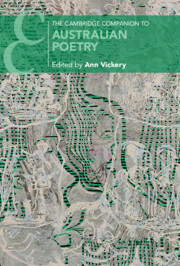Book contents
- The Cambridge Companion to Australian Poetry
- The Cambridge Companion to Australian Poetry
- Copyright page
- Contents
- Figures
- Contributors
- Acknowledgements
- Chronology
- Introduction
- Part I Change and Renewal
- Part II Networks
- Part III Authors
- Part IV Embodied Poetics
- Part V Expanding Form
- 18 Hybrid Forms
- 19 Sound, Visual, Digital, and Conceptual Poetries in Australia
- Further Reading
- Index
- Cambridge Companions To …
- References
19 - Sound, Visual, Digital, and Conceptual Poetries in Australia
from Part V - Expanding Form
Published online by Cambridge University Press: 06 June 2024
- The Cambridge Companion to Australian Poetry
- The Cambridge Companion to Australian Poetry
- Copyright page
- Contents
- Figures
- Contributors
- Acknowledgements
- Chronology
- Introduction
- Part I Change and Renewal
- Part II Networks
- Part III Authors
- Part IV Embodied Poetics
- Part V Expanding Form
- 18 Hybrid Forms
- 19 Sound, Visual, Digital, and Conceptual Poetries in Australia
- Further Reading
- Index
- Cambridge Companions To …
- References
Summary
This chapter discusses the songlines of First Nations people as living song emerging from the land and vehicle of cultural knowledge. It then analyses engagements with an international avant-garde in the twentieth century, through the transnational performances of Amanda Stewart and Chris Mann, Jas H. Duke’s Dada-inspired sound poems, Javant Biarujia’s created language, and the performance poetry of Ania Walwicz and Ouyang Yu. The chapter also investigates visual poetry in Australia, including the techniques of cryptographic symbols and icons, comic strip narratives, and collage. Using the sonnet poems of Alex Selenitsch and Cath Vidler as examples, it asserts the value of comparative readings of visual and concrete poetry. The chapter suggests that concrete poetry of the 1970s, hypermedia experiments of the 1980s, and Language art all typically fall outside institutional histories and often unsettle the constitution of a national literature. It distinguishes conceptual poetry from electronic poetry, arguing that the conceptual poem questions the ground of the work while electronic poetry tests new environments and makes poetry through the test.
- Type
- Chapter
- Information
- The Cambridge Companion to Australian Poetry , pp. 334 - 350Publisher: Cambridge University PressPrint publication year: 2024

